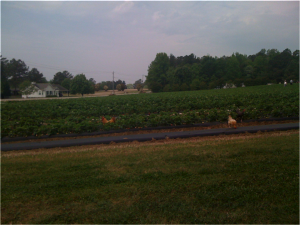I value local foods systems. I shop regularly at a couple of local farmers markets, choose North Carolina foods at retail and at restaurants when I can and spend most of my days supporting food business in our state.
But I also I value food that won’t make me sick.
Local food isn’t safe food. Local food isn’t unsafe food.
Things can go wrong regardless of location. Food safety can be managed here as well as it can be elsewhere. What matters is not where it is from, but who is managing risks.
A couple of years ago I went to a local farm 5 miles from house to buy strawberries I saw chickens roaming the rows being harvested (weed control according to the producer). I told him I thought it was a food safety risk. He guffawed. I left.
I like the idea of food hubs; as CSAs respond to increasing demand more will pop up. But food hubs aren’t inherently safer than other sources because of less transit time. The systems could be safer if they have folks who know how pathogens live and move creating and implementing food safety strategies.
According to SC Now, there’s a new one in Florence County, South Carolina that should be ready to go in April 2016.
You’ve probably heard about farm to table.
Jody Martin wants to broaden that concept in a big way.
The 52-year-old Florence County native has set up shop next to a 25,000-square-foot warehouse on Bluff Road that he hopes will be brimming with food and activity by April 2016
In a nutshell, farmers would send what they grow to Marion. Martin and his team would market, package and deliver that food wherever they can and a big chunk of the revenue stream would flow back to farmers.
“And we’d have a little bio of each farmer and farm on our website,” Martin explained. “We want people to have a connection and know who is growing their food.”
Julie Norman sees the Food Hub as the first piece of the puzzle. As Marion County’s economic development director, she views the hub as a “tremendous opportunity” that piggybacks upon the area’s agricultural heritage.
“To showcase not only food products that are developed and produced in the incubator but also fresh fruits and vegetables grown in the Pee Dee as well as other products grown in South Carolina,” she said.
One of the main thrusts of what Martin is preaching is being able to enjoy freshly harvested items. Produce from California, for instance, will arrive with “a lot of bumps and bruises,” as Martin calls it.
“That product is road weary. It’s not at its peak ripeness. There’s shrinkage,” he said, and it was probably harvested far too soon.
Not for Food Hub folks. They’ll get produce harvested at peak times just after it’s plucked from the vine, ground or plant. There’s also the food safety aspect – knowing exactly what the source of a product is and knowing it hasn’t been in transit for a while.
“We want folks to have the freshest food available – either the same day it’s harvested or the day after,” Martin said. “This is why I love what I do.”
Food producers/processors/handlers/sellers, regardless of size and location, are the primary partners in food safety. They make choices to keep pathogens out of kitchens, regardless of location.

